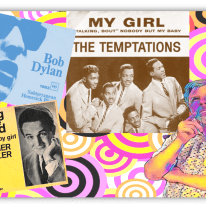As I began my freelance writing journey, I ran across a community of indecisive people, like myself, located in the corner of the internet called the Puttyverse.

It’s a lovely place, full of lovely people, all with interests as diverse and sporadic as my own.
I fell right in place. Though I haven’t had the opportunity to dive into the community as much as I hope to, I have enjoyed pursuing the vast sea of resources pushed my way via email.
One of the fun little emails that periodically go out includes creative prompts. Prompts to get the juices flowing, to get you thinking, writing, arting… whatever it is you do.
The first prompt I received was “singing.”
“Fun! I can write about singing. I love singing.” I thought as I opened a new Google doc.
That was a month ago. A month and two days, actually.
Everything is fine.
Time isn’t real, anyway.

Here, take a break.
How about a nice mushroom coffee?

While I didn’t get to work due to the dumpster fire that is my life, this prompt got my wheels turning.
How does singing affect the brain?
I thought of writing about how singing physically works in the body – vocal cords and whatnot. Then the lightbulb lit up. Brain. Duh.
“Singing for your brain!” I sang to myself silently, in my brain.
Years of studies by those much more qualified and intelligent than myself have unlocked fascinating information on the effect of music and, particularly, singing on the brain.
How singing affects your brain:
♫ Neurons in your brain react specifically to singing.
A group of neurons in the brain’s auditory cortex react exclusively to voice and music. According to a study conducted by MIT neuroscientists, the same area had no reaction to regular speech or instrumental music.
Electrodes recording electrical activity in the brain were placed in participants’ skulls to obtain the information.

The electrocorticography procedure is just a tad invasive, so volunteers aren’t jumping to have their heads probed.
Fortunately for the study, this is a common technique for epilepsy patients before surgery. These patients can participate in brain function studies during their several-day monitoring period before surgery. MIT researchers obtained consent from 15 participants over the course of several years (Trafton, 2022).
♫ Singing stimulates multiple areas of the brain

Our brains are incredibly resilient and adaptable.
Belting out your favorite tune doesn’t only affect the auditory cortex—multiple areas of the brain light up at the same time when you get to singing.
The simultaneous effect greatly benefits people with an injury or impairment in one area of the brain. Singing can stimulate other healthy spaces and assist in communication.
♫ Improves mood and mental health

A UK-based study of 20 participants found benefits to mood and mental health as a result of group singing.
The Sing Your Heart Out project revealed that most participants found group singing to be one of, if not the only, most influential piece of their mental health recovery and overall wellness. (Shakespeare, Whieldon; 2018).
♫ Stimulates memory

Music is a well-known therapy for Alzheimer’s and dementia patients.
My own grandmother played piano well into her 80s, despite being unable to recognize her children.
Singing for the Brain, a dementia support service, encourages group vocal exercises as a therapy to improve brain activity. They utilize songs patients are familiar with to promote well-being (Alzheimer’s Society, 2022).
Another study by the Alzheimer’s Foundation discovered that singing familiar songs often helped patients remember lyrics and autobiographical memories (Joy, 2020).
♫ Singing is cathartic

The mood boost singing provides is not without explanation.
Science is uncovering how group singing lowers stress, fights depression, and enhances overall wellness
Endorphins and hormones such as oxytocin are released when you sing along with others. It turns out this is an “evolutionary reward” for socializing, and lowers feelings of anxiety and stress while enhancing feelings of trust (Horn, 2013).
So, Sing! My Angel of Music!

Luckily for me, you don’t have to be an overly talented vocalist to benefit from a bit of song therapy.
Time writer Stacy Horn shares:
“According to one 2005 study, group singing ‘can produce satisfying and therapeutic sensations…
…even when the sound produced by the vocal instrument is of mediocre quality.’”
(Horn, 2013)
Just move along if you catch me mediocrely singing in the Starbucks drive-thru line.
I’m exercising my brain.
Let the author know that you liked their article with a “heart” upvote!





Nice job, Shelby!
“Luckily for me, you don’t have to be an overly talented vocalist to benefit from a bit of song therapy” That’ll be my best news today. 🙂
That is good news but I then read the Stacy Horn quote: ‘even when the sound produced by the vocal instrument is of mediocre quality’
What if the vocal instrument doesn’t match upto mediocre? I’d be delighted if someone said my singing reached the standard of mediocre. 😁
Do those health benefits extend to extreme guttural death metal vocalists? I’m not so sure… there have to be limits, right?
https://youtu.be/482tDopNzoc
Aside from the obvious risks to throat health, I’d put my money on some solid cognitive and socio-emotional benefits.
Or it it “antisocio-emotional?” 🤔
Eric Bachmann gives a great vocal performance on “Harnessed in Slum”, maybe the best in all of nineties-era indie rock, with his enunciated near-death metal-like barking.
On Alias, there was a fascinating band with a name similar to Cannibal Corpse. Cerebral Corps. Late-sixties influences, but it’s not clear to me who they were inspired by. One album: Attributed to…
Ooh, just the thing we need to get the ol’ synapses going!
As I was reading about a brain area near the temporal lobes that is activated by some stimuli and not others, I was reminded of visual perception research that looked at activation in the fusiform gyrus, which the principal investigator Nancy Kanwisher called the “fusiform face area” for its seeming specificity for face stimuli over other visual stimuli.
And upon looking at the research articles upon which the Trafton write-up was based, lo and behold, I see that Nancy Kanwisher is the senior investigator on this research as well.
We should tread carefully here with respect to interpretation. Not just because more studies should be done to really determine what’s going on….but because from my time going to vision research conferences, by far the most heated arguments came from the face researchers on the question of stimuli-specific or function-specific processing areas!
I dare say I lean toward the function-specific processing camp, but in truth I will just hunker down in a foxhole and wait for a victor to emerge from their bloody battle.
BTW Shelby, my wife and I have tried some mushroom supplements (a coffee, a tea and a broth) since your last article. Still just testing them out, but still, you caught our curiosity. Considering making them a more regular part of our routine. Thanks for the tip!
Excellent info, Shelby. However, I’m in the office today and shall refrain from delighting my colleagues in the adjoining cubicles with my dulcet rendition of “Oops, I Did It Again.”
But once I’m in the car on the way home, watch out!
Oops, I did it again
I ordered with cream; but meant to say “black”
Barista, baby
Oops, you think I’m a fool, can’t swing a drive-thru?
I’m Not. That. Caffeinated…
Love it, Shelby! I always appreciate learning more behind the science of how music impacts people. I guess it also would lead one to presume that the mere existence of certain chemicals and hormones naturally occurring in your body have a direct impact on how one reacts to particular music, and which specific areas of the brain react to said particular music; what song is ultimately appealing at that moment depending literally on your state of mind.
For instance, someone who’s blood pressure rate typically registers a shade above catatonic doesn’t often have the natural craving to counteract excessive stress hormones with calming influences. And introducing loud drums and bass and screaming guitars generates chemical reactions that are welcomed and have room to expand in that area of the mind without having an overall detriment to their present mood….
No matter their (questionable) singing abilities. 🙃
I LOVE singing. I am fairly average. I am smart-ish musically, but my range is a little limited (a baritone). But singing in a choir covers up a lot of individuals’ flaws and the result is more than the sum of its parts.
I’ve sung in community choirs about 10 different seasons, and it’s been really enjoyable. I even dragged Mrs. Crawford and 3 of my 4 kids to various seasons. Sometimes the time constraints make it hard, but the experience has always been positive.
I used to sing in a church choir, and also went caroling every Christmas as a kid. I loved it, and I do miss it now.
When I was in my teens I worked in a kitchen, and then in my 20s in a somewhat laissez-faire office in which I was singing all the time. And I loved doing karaoke in Japan, but I haven’t done it in maybe 10 years. Nowadays I may sing in the shower or sing while I’m cooking…but pretty rarely.
I’m sure my voice isn’t what it used to be. but it would be good to get back into it somehow.
Next time my family has something smart-alecky to say about my random musical? outbursts, I will tell them that I am exercising my brain. That will shut them up. They know that I need all of the help that I can get.
I wonder if there has ever been any research done on whether groups of people who sing together form especially strong bonds with each other. My family has always had a tendency to sing together at holiday gatherings, during long car trips (or short ones), around campfires, etc. I think it has made us closer, but I always assumed that was because it is impossible to argue while singing.
I don’t know about brain research, but there is sociological work on “muscular bonding” (first studied among armies) and how synchronized activities help strengthen group affinity, and often lead to profound spiritual experiences as well.
I would say that studies first done with armies would apply to our family rather well. Thanks for the info!
I have “Take This Waltz”, and most of Leonard Cohen’s songs committed to memory. I never stopped to think: Oh, I feel better now. I’m going to monitor myself the next time.
Keep writing, Shelby.
Love this article and this topic. Thank you for sharing it! As some one who sings for a living, I have all but forgotten the benefit of just letting go and belting something out without caring how it sounds. Even when I do karaoke, I tend to micro-analyze every detail of my performance, which sounds silly, but that’s how I roll. Reading this is putting a different idea in my head, which I need.
I can also totally confirm about music stimulating memory, and have the last 3 years of my mother’s life and a room full of seniors at a retirement home to back me up on that one. Someday I will write more about it.
Thank you, Shelby, and keep it up!
Thank you! It’s so hard to “chill” when we’re passionate about something. We completely ignore how simply participating does us all the good we need!